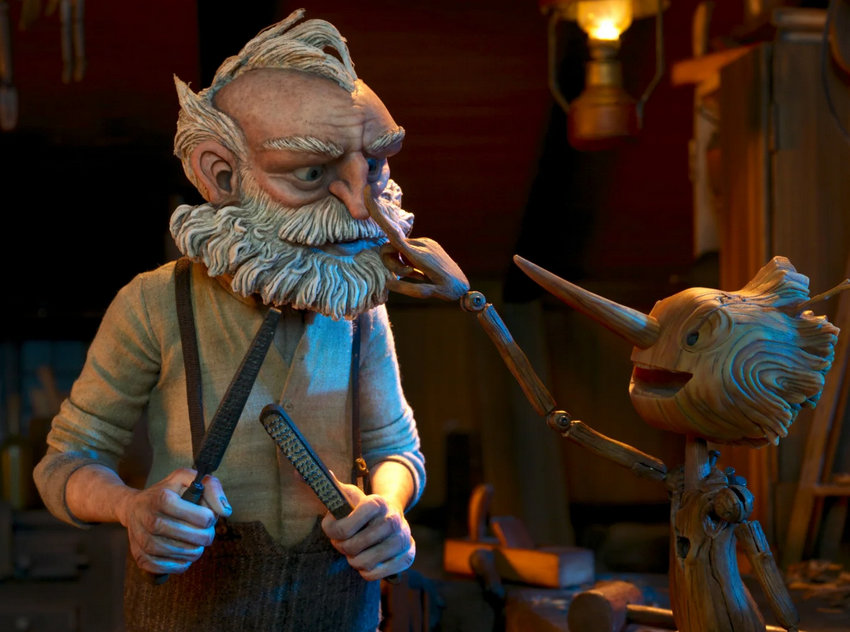Animation has always been an underrated and underestimated medium in terms of both
film and television. Despite constantly proving itself successful in both fields, it is largely written off as either kiddy fodder or something not worth taking seriously and there is no bigger example of this than Netflix.
Despite winning an Oscar for their stop-motion animated “Pinocchio” feature and declaring “animation is cinema,” the streaming service and distributor seems to have largely given the medium its cold shoulder. They’ve canceled several successful animated shows of theirs, as well as several in-production features. Yet, they keep pumping out content like there’s no tomorrow. Recently, Carolyn Giardina of The Hollywood Reporter wrote about how the streamer announced several new animated features releasing both this year and the next.
Yet, despite the confidence in their announcement and their Oscar win, many still find themselves asking if Netflix actually cares about the medium of animators and the teams behind it. Giardina lists an interesting array of upcoming animated features for the service, including a “Spongebob” spin-off film, an original movie about dreams, an American adaptation of “Ultraman” and more. However, there is one notable stand-out amongst the roster and that is next year’s animated holiday film, “That Christmas,” based on a series of children’s books by Richard Curtis of “Four Weddings and a Funeral” fame. The film was announced in the summer of last year as one of a few animated projects from Europe for which the streamer acquired the distribution rights.
One of the films was “Ember,” a new hand-drawn animated film from Sergio Pablos. Pablos previously directed the holiday comedy “Klaus” for the Netflix, which won several awards back in 2019, scored an Oscar nomination for Best Animated Feature, and was a big hit for them. However, later that year, Rebecca Rubin reported for Variety that Netflix had axed production of the feature and gave no explanation. Fortunately, Pablos still retained the rights to his project, meaning he is now able to shop it around to other potential distributors.
However, this isn’t the first example of cancellations and it likely won’t be the last. In her article, Rubin noted how “Ember” was one of several animated projects that the company scrapped that year as she previously reported the cancellation of an antiracist series aimed at preschoolers and a new Ava DuVernay’s planned adaptation of the “Wings of Fire” book series. It shows how the streamer, which has been joked by many as unable to say no to a green light, doesn’t have much interest in keeping a lot of their animated projects going in the long run.
Indeed, these reports show that the problem with Netflix’s attitude towards animation doesn’t just stop at feature films. It also applies towards animated series and shorter films and specials and this problem seems to have been around for a year now. In April of 2022, it was reported that the service was going to entirely restructure its animation division. Alejandra Gularte wrote for Vulture how the streamer was going “to focus on projects that bring in the same number of viewers as Boss Baby,” which had been adapted into multiple series for the platform. However, you can’t make an omelet without breaking some eggs. Not only did they let go of their director of creative leadership and development for original animation, Phil Rynda, but they also scrapped several animated series, including “Toil and Trouble” from “My Little Pony: Friendship is Magic” creator, Lauren Faust, and the long-in-development adaptation of Jeff Smith’s “Bone.”
However, it would be one thing if this was all restrained to projects that had yet to see the light of day. TV shows get canceled and it’s an immutable fact of the industry. Netflix is certainly no stranger to canceling shows with dedicated fan bases, such as “Warrior Nun,” “Anne with an E” or “The Dark Crystal: Age of Resistance.” All these shows were critical darlings and brought in decent numbers but it seemed like the platform was only interested in shows that had the same amount of success as “Stranger Things,” “Bridgerton,” and “Wednesday.” Of course, this extends to animated shows as well, with cult hits such as “The Midnight Gospel” and “Dead End: Paranormal Park” getting the boot. However, an especially egregious example of this occurred back in January when the streamer canceled the adult-animated series, “Inside Job.”
“Inside Job” was originally one of many shows that was part of Netflix’s animation strategy of releasing one episode order as multiple seasons. However, the success of the show and cries of fans caused Netflix to decide to release the episode order as two parts of season one and officially renew the show for a second season back in June. Unfortunately, just this year, Todd Spangler of Variety reported that the series creator took to Twitter to confirm that the show had gotten its plug pulled before the second season had finished. It is one thing to cancel a TV show. It’s another thing to give false hope and to use up the hard work of the animators and production team before turning around and changing your mind.
Does this mean that Netflix is the biggest problem that the animation industry is currently
facing or that it’s the sole disrupter? Not at all. Returning to Giardina’s THR article, one of the most important films listed as an upcoming release is this year’s “Nimona.” Giardina mentions how “Nimona” was previously a project at Blue Sky Studios, the animation studio behind “Ice Age.” However, Blue Sky was shut down by Disney in 2021, resulting in the filmmakers having to shop the project to other studios. Indeed, while Netflix can be antagonistic towards animation, it is very much a savior in the story of “Nimona.” But while Netflix cancels their shows, it doesn’t erase them from existence.
Last summer, Warner Bros. Discovery caused many controversies when they canceled TV shows and shelved many completed upcoming releases and gave them no other options. Many were taken off of HBO Max and had no physical release, resulting in the projects technically becoming “lost media” solely to become a tax write-off for the company. Beloved shows such as “Infinity Train” and “Final Space” are being denied access to be seen legally so that Warner Bros. Discovery can spend less money.
Netflix isn’t the problem with animation but it is simply part of a larger problem. Animators, and their pet projects, deserve better treatment than to be tossed aside so carelessly.







